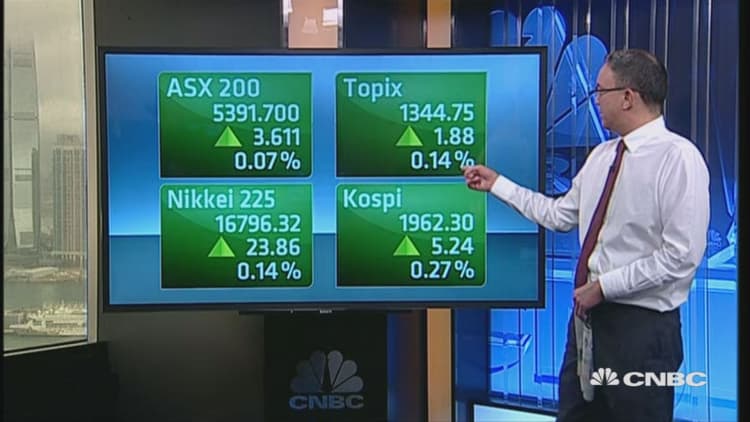
Markets in Asia ended mostly higher on the final trading day of the week as traders awaited direction from U.S. Federal Reserve chief Janet Yellen's comments due later.
Japan's closed up 62.38 points, or 0.37 percent, at 16,834.84, after data showed consumer prices in April fell, likely putting additional pressure on the Bank of Japan to ease at its next monetary policy meeting, set for June.
Before market open, Japan's Statistics Bureau released the consumer price index (CPI) for April, which showed a 0.3 percent annual decline in core CPI, which excludes food prices but counts oil products. It was a tad better than the median Reuters poll estimate of a 0.4 percent fall.
Japan's shares likely also received support after Reuters reported, citing local media reports, that Prime Minister Shinzo Abe was considering delaying a planned sales tax hike for two years. That may assuage concerns that the sales tax hike could damp already weak economic growth. But after the G7 leaders' summit in western Japan Friday, Abe told reporters a decision would be reached before July upper house elections, Reuters reported.
Across the Korean Strait, the Kospi closed up 12.11 points, or 0.62 percent, at 1,969.17. Down Under, the ASX 200 advanced 17.82 points, or 0.33 percent, to 5,405.91, with most sectors finishing in the green.
In Hong Kong, the reversed losses to close up 179.66 points, or 0.88 percent, to 20,576.77.
Chinese mainland markets closed modestly, with the composite nearly flat, down 0.90 points, or 0.03 percent, at 2,821.53, and the Shenzhen composite lower by 1.88 points, or 0.10 percent, to 1,807.03.
Oil prices touched a psychologically key level of $50 a barrel on Thursday, before retreating. As of 2:51 p.m. HK/SIN, global benchmark Brent futures were down 0.71 percent at $49.24 a barrel, while U.S. crude futures shed 0.63 percent to $49.17.
"Brent crude's failure to hold above the $50 level, and weak capital goods orders from the U.S. appear to have halted U.S. markets and the dollar overnight," said Angus Nicholson, a market analyst at spreadbetter IG.
The slipped 0.13 percent, while the S&P 500 was off by 0.44 points. The eked out a 0.14 percent gain.
Energy plays ended mixed in Asia, with Santos shares up 0.67 percent, Oil Search adding 1.79 percent, Inpex up 3.6 percent and Chinese mainland shares of Sinopec down 1.31 percent.
Investors will look ahead to comments from Federal Reserve Chair Janet Yellen, who is expected to answer questions Friday afternoon in the U.S. as she receives an award at Harvard University.
But despite the recent round of other Fed officials' comments talking up the likelihood of a rate hike in either June or July, analysts at Singapore's OCBC Bank said in a note that Yellen might not divulge the kind of hints on rates that the market is anticipating at the Boston-event.
But Nicholson added that, with the risks from Brexit receding, the chances of "a mid-June hike from the Fed may actually be far higher than the 29 percent probability the market is currently giving it."
In the currency market, the dollar was relatively flat against a basket of currencies, with the dollar index trading at 95.175 as of 2:55 p.m. HK/SIN.
The Japanese yen reacted mildly to the CPI data, with the dollar-yen pair at 109.67 in the afternoon Asia time, after climbing as high as 109.99 during the session after the data, compared with around 109.61 before market open. Major exporters closed mixed, with Toyotashares down 0.13 percent, Nissan nearly flat and Sony up 0.2 percent.
A stronger yen is usually a negative for exporters as it reduces their overseas profits when converted into local currency.
The Chinese yuan was relatively weaker against the greenback at 6.5601 in the afternoon local time, after the People's Bank of China (PBOC) set the yuan mid-point fix at 6.5490 on Friday. Earlier this week, the Chinese central bank had fixed the yuan mid-point at lows not seen since 2011, suggesting a stronger yuan against the dollar.
The moves in the currency suggested the yuan isn't entirely tracking its peg to a basket of currencies of its trading partners, analysts said.
"When the dollar weakens, the yuan peg follows," said Stephen Innes, a senior trader at OANDA in a note. "When the dollar is firmer, the yuan peg resorts to the basket mechanism to smooth out the inevitable yuan depreciation, and slow the pace of capital outflows."


